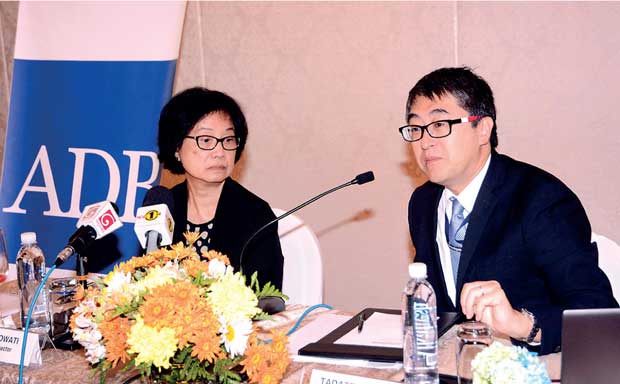Reply To:
Name - Reply Comment

By Chandeepa Wettasinghe
The Asian Development Bank will be providing up to US$ 5 billion in financing to Sri Lanka through its new Country Partnership Strategy (CPS) over the next five years until 2022, in order to help the country transition into the upper middle income status.
“This Country Partnership Strategy covering 2018-2022 was just approved by the board on August 16. The CPS has been developed to support Sri Lanka’s transition to upper middle income country status,” ADB Country Director Sri Widowati said yesterday.
Sri Lanka’s current gross national income per capita is US$ 3,835, which fell from US$ 3,843 due to the depreciation of the rupee. The threshold for upper middle income status is US$ 3,955 until July 2018, when the World Bank revisits country income level limits.
Widowati said that the CPS will be supporting Prime Minister Ranil Wickremesinghe’s vision for Sri Lanka, articulated in his policy speeches in October 2015 and November 2016, as well as in the public investment project for 2017-2020.
“In the new CPS we are providing US$ 600-650 million per year which is already secured, but we are planning to provide between US$ 800 million to US$ 1 billion per year in combination with other ADB resources,” Widowati added.
She said that Sri Lanka has attracted more ADB funding than it had been allocated in recent years, due to the country’s positive performance.
Over the past several years, ADB had provided Sri Lanka US$ 340-400 million in annual financing, she said.
According to ADB Senior Country Economist Tadateru Hayashi, the new CPS will focus on two pillars of driving growth, and improving the quality of growth.
He said that growth driving pillar will support diversifying production, and improving productivity in the country, by funding projects that will improve human capital development and logistical and infrastructural development.
“Under the pillar of improving the quality of growth we will look at strengthening agricultural infrastructure and commercialization, improving public service delivery and expanding access to financing for the small and medium size enterprises. We will also get into the health sector,” Hayashi said.
He said that the Colombo-Trincomalee Economic Corridor concept will influence both pillars, and as will projects addressing gender equality and climate change and sustainability, such as renewable energy and desalination plants.
Hayashi said that ADB’s own private sector investments will diversify from its current focus in the financial sector, into agribusiness, health and infrastructure sectors.
Further, he added that the ADB will promote private sector development by supporting the improvement of the World Bank’s Doing Business Index’s three pillars of enforcing contracts, resolving insolvency and getting credit.
The ADB will team up with the five state owned institutions; the Ceylon Electricity Board, the Naitonal Water Supply and Drainage Board, the Road Development Authority, Sri Lanka Railways and Sri Lanka Ports Authority to improve their management. ADB currently has 31 ongoing projects in Sri Lanka, with a commitment of US$ 3.4 billion.